King Lear By William Shakespeare Plot SummaryBackground Information About William Shakespeare:English playwright and poet William Shakespeare lived from 1564 until 1616. His works have had a significant influence on literature and society, and he is largely regarded as one of the finest writers in the English language. Shakespeare produced roughly 38 plays in addition to many sonnets and poetry. His plays, which are being produced and studied today across the globe, are renowned for their language, characterization, and examination of topics relevant to everyone, like love, power, and identity. Romeo and Juliet, Hamlet, Macbeth, Othello, and King Lear are some of his best-known plays. Shakespeare's works continue to impact and inspire audiences and artists, and his legacy is still a significant element of English and world culture. 
King Lear As One of His Famous Plays:One of William Shakespeare's most well-known plays, King Lear, was originally presented in 1606. King Lear, an elderly monarch, decides to divide his realm among his three daughters based on their protestations of love for him in the tragedy. The youngest daughter, Cordelia, doesn't want to appease her father, so he disinherits her. This starts a series of events that ultimately bring Lear and his family to their demise, allowing for a more thorough examination of concepts like madness, family, and power. Shakespeare's play King Lear, regarded as one of his most potent and emotionally devastating works, is renowned for its dense narrative, rich characters, and poetic language. It has been transformed over the years into several films, TV series, and theatrical performances and continues to be a well-known and significant work in contemporary literature and culture. Significance of The Play's Plot:The narrative of King Lear is important because it examines the negative effects of unbridled authority, family disputes, and societal norms. This plot device reveals the complexity of human nature and the frailty of human relationships before coming to a tragic and thought-provoking conclusion. 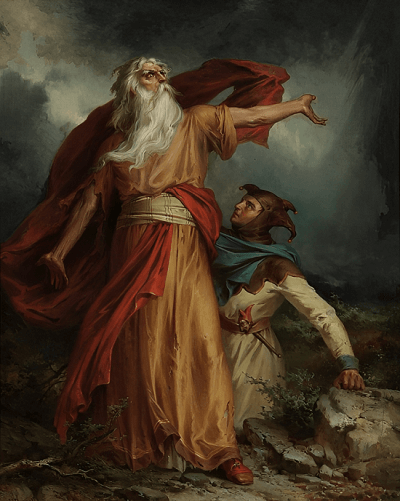
The Main Characters:There are several remarkable characters in King Lear, including the title character, a strong king who makes the disastrous choice to split his kingdom among his three daughters. Goneril, Regan, and Cordelia are his daughters; they each have specific reasons and personalities. Another significant character is the Earl of Gloucester, who is caught up in a family feud when his adopted son Edmund tries to turn him against his biological son Edgar. Plan To Divide His Kingdom:At the beginning of King Lear, the aging king declares his intention to split his realm among his three daughters, Goneril, Regan, and Cordelia. With the promise that the person who loves him the most will receive the largest share of the kingdom, he wants them to publicly announce how much they love him. Goneril and Regan lavish their father with praise, declaring their love for him beyond words. However, Cordelia declines to flatter her father and claims she only loves him to the extent that a daughter should. Infuriated by Cordelia's remark, King Lear disowns her and divides her kingdom-wide inheritance among her sisters. The consequences of this choice bring Lear and his family's demise, highlighting the perils of arrogance, deceit, and the mistakes of using love as a yardstick for worthiness. 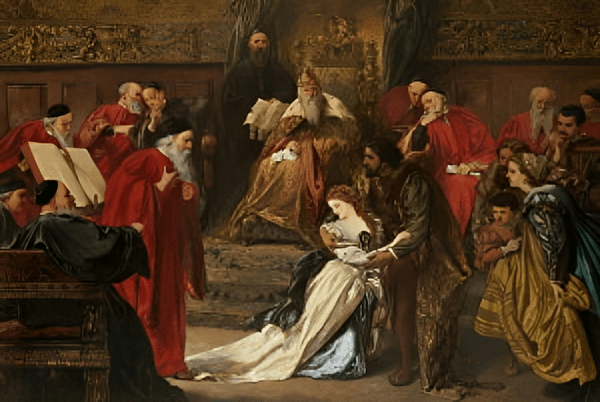
Cordelia's Refusal:The tragic events that transpire when Cordelia refuses to appease King Lear are key turning points in the play. Cordelia refuses to partake in this hollow flattery when Lear asks each of his daughters to state how much they love him to decide the value of their inheritance. Instead, she asserts that her acts will demonstrate her love for her dad and that she loves him like a daughter should. The ego and authority of Cordelia's father are threatened by her refusal to partake in fake expressions of love and her dedication to honesty and integrity. Her statement incenses Lear, who then abandons her and gives her kingdom portion to her sisters, Goneril and Regan. Lear finally suffers due to this choice since he learns the actual character of his two remaining daughters and is left with nothing but his pride and regrets. Sincerity, integrity, the perils of pride and flattery, and the complexity of family dynamics are some themes that Cordelia's refusal to flatter her father brings to light. 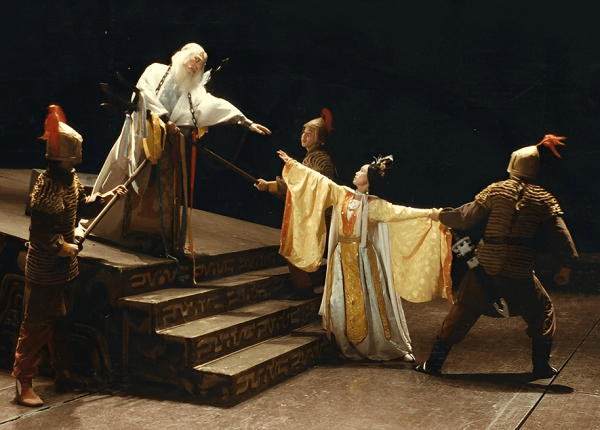
The Power Struggle Between Goneril and Regan:Goneril and Regan, King Lear's two eldest daughters, engage in a power struggle to take control of the kingdom after he divides it between them. Goneril appears better because she has been given a larger portion of the kingdom. Regan quickly exerts herself and joins forces with her sister to further their dominance. By refusing to allow Lear to have his entourage of knights and publicly shaming him, they start to take away his power. The sisters' lust for dominance over the kingdom drives them to act increasingly heinous and brutally, including blinding the Earl of Gloucester and imprisoning and torturing Lear and his followers. Their desire for control, however, ultimately brings them to their demise as they turn against one another in a final, fatal fight. The conflict between Goneril and Regan brings the play's themes of ambition, greed, and the destructiveness of unbridled power to light. It also underlines the play's themes of the intricacies of familial connections and the repercussions of betrayal. 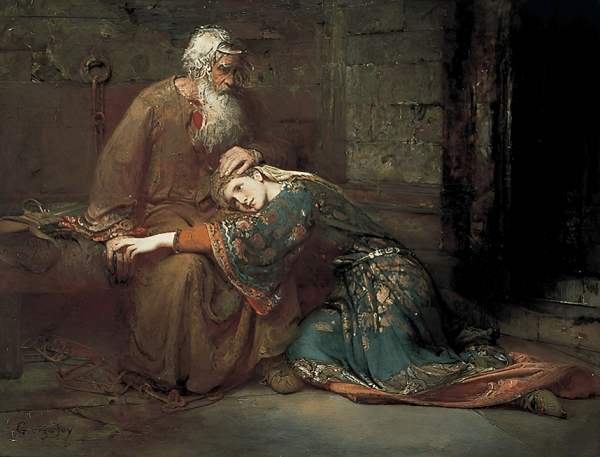
Edmund, The Illegitimate Son of Gloucester:Being the Earl of Gloucester's illegitimate son, Edmund plays a significant role in King Lear. Edgar, Edmund's legitimate half-brother, has been unfairly favored by their father, Edmund feels, and he is resentful of his status as a bastard. Edmund plots to accuse Edgar of scheming against their father to achieve rank and authority by accusing Edgar of being involved in the plot. Due to Edmund's deception, Edgar is banished from the court of King Lear's daughters while he rises to prominence there. Edmund's actions further complicate the already convoluted web of family relationships in the play, heightening the feeling of betrayal and mistrust. The play examines the complexities of human nature and the disastrous outcomes that can emerge from unrestrained ambition and greed. Edmund's character also highlights questions about legitimacy, inheritance, and the influence of societal expectations on individuals. The Theme of Blindness and Deception:In King Lear, themes of blindness and deceit are prominent. The drama examines blindness, literally and figuratively, and how deception and self-delusion can result in catastrophe. Characters throughout the play experience blindness, both literally (Gloucester has his eyes gouged out by Regan and Cornwall) and symbolically (his pride and hubris blind Lear). Additionally, characters lie to themselves and others, which causes misunderstanding, betrayal, and tragedy. For instance, Edmund tricks his brother and cheats his father, causing them to fail. Lear, meanwhile, is duped by his two eldest daughters, who flatter him to obtain power, causing him to abandon Cordelia because she is his faithful daughter. The play's examination of the perils of hubris, manipulation, and the intricacy of interpersonal relationships is highlighted by the topic of blindness and deception. The play makes the point that one may only escape such problems by having a clear-eyed view of oneself and others and that blindness and deception can have fatal results. 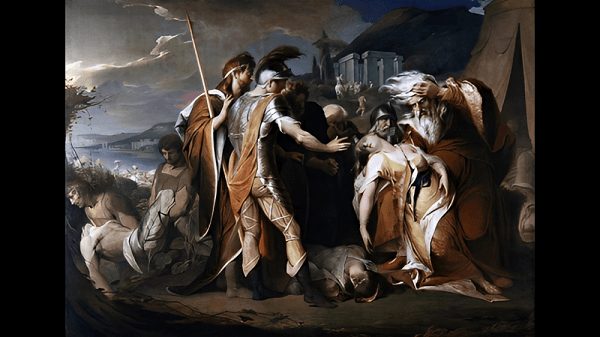
Lear's Descent into Madness:King Lear loses control after being betrayed by his two eldest daughters, and he starts to explore the countryside with his Fool and Edgar in disguise. Lear's unpredictable behavior, rambling speech, and preoccupation with pain all show that he is becoming insane. Lear is exposed to the elements as he walks through the desert, which causes him to lose touch with reality. His relationships with his friends, notably Fool and Edgar, show how desperate and helpless he is becoming. Lear is overwhelmed by his lunacy and soon loses all sense of reality despite their best efforts to console him. His fall into insanity serves as a potent allegory for the frailty of the human mind and the perils of unrestrained arrogance and hubris. The representation of Lear's insanity also brings to light the play's investigation of the complexity of human emotions and relationships and its criticism of the social and political structures of its day. The Subplot of The French Invasion:King Lear's French invasion subplot, which Cordelia leads to retake her father's realm, plays a significant role. After being exiled by her father, Cordelia marries the King of France and returns with an army to overthrow her sisters' dominion. The French invasion serves as a counterpoint to the play's primary plot, underlining its examination of power, politics, and the place of gender in society. The play's themes of loyalty, fairness, and the value of family relationships are all furthered by Cordelia's defiance of conventional notions of a daughter's place in society. Ultimately, though, the French invasion fails to re-establish order in the realm, and Cordelia's tragic end highlights the play's overarching theme of the divisive nature of power and ambition. The French invasion subplot provides a crucial counterpoint to the play's main plot, giving complexity and depth to examining human character, society, and politics. 
Torture of Gloucester:A terrible and terrifying scene in King Lear involves Regan and her husband Cornwall torturing Gloucester. Gloucester is abducted by Regan and Cornwall and treated to horrible torment when Edmund turns his father and brother against one another. Gloucester cries in pain because Cornwall orders his servants to gouge his eyes. Gloucester is then expelled from the realm by Regan, who later proves to be just as relentless as her sister Goneril, leaving him to wander the countryside alone and blind. The drama explores the perils of unrestrained ambition, brutality, and betrayal, and the torture of Gloucester serves as a potent reminder of that. It is a striking metaphor for the play's pervasive blindness and deception and a reminder of interpersonal and political warfare's psychological and physical costs. The scenario is a potent commentary on the sad results of human brutality, betrayal, and power's corrupting effect. 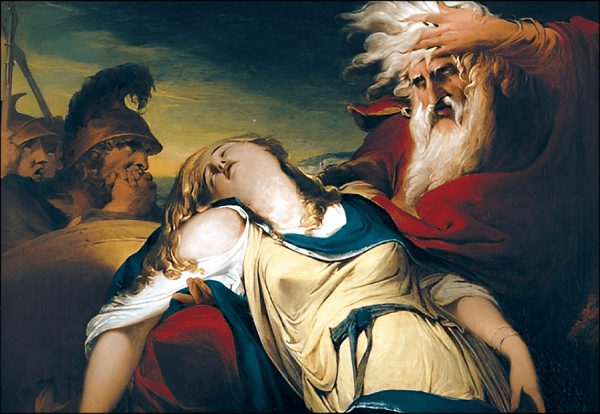
Edgar's Plan to Disguise Himself:Edgar, Gloucester's legal son, develops a scheme to impersonate a crazy character named Tom o' Bedlam to aid his father and add comic relief to the play. Edgar can enter the mad world and witness the mayhem and damage caused by the play's protagonists by disguising himself in rags and filth. His father, blinded and betrayed by his family, turns to him for support and direction. The play's significant subplot centers on Edgar's scheme to pose as a crazy person, emphasizing the complexity of human identity and the theme of deception. Additionally, it offers a much-needed reprieve from the play's gloom and tragedy, offering a glimmer of humanity and hope amidst the madness and chaos. Additionally, Edgar's disguise as Tom o' Bedlam is a nod to a common folk tradition in England at the time, which gave the play familiarity and humor for modern audiences. 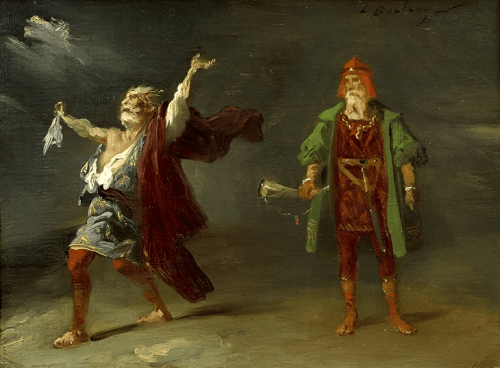
Final Showdown:In King Lear, the conflict between Lear and Cordelia's and Goneril and Regan's forces culminates in a terrible and brutal clash. The deceit and ambition of Cordelia's sisters finally render her armies outnumbered and unwieldy, despite her best efforts to bring justice and order back to the country. Lear passes away with a broken heart after realizing the full amount of his foolishness and the brutality of the world around him in the final battle, where Cordelia is captured and given the death penalty. The play's examination of power, politics, and the human condition is powerfully brought home in the pivotal clash. It emphasizes the sad results of human ambition and the destructiveness of betrayal in families. The last scene is a powerful statement on the frailty of justice and the value of loyalty and love in the face of injustice and brutality. In the end, King Lear is a play that inspires deep melancholy and introspection in its viewers, reminding them of the gloom and complexity of the human experience. 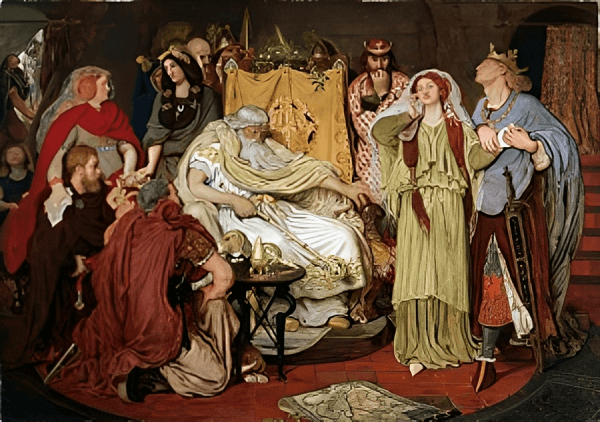
The Tragic Ending of The Play:A number of the principal characters pass away in King Lear's terrible and devastating conclusion. After realizing the full magnitude of his foolishness and the brutality of the world around him, Lear dies from a shattered heart. Lear's cherished daughter Cordelia is kidnapped and given a death sentence by her scheming sisters Goneril and Regan. Despite Lear's efforts to save her, Cordelia is hung, and her passing causes Lear to become completely discouraged. In addition, Goneril and Regan both pass away after annihilating one another in their vicious struggle for dominance. The illegitimate son of Gloucester, Edmund, also passes away after being fatally wounded in a duel with his brother, Edgar. The play's tragic conclusion serves as a potent reminder of the negative effects of human ambition, greed, and betrayal. In the face of cruelty and injustice, it emphasizes the value of love, devotion, and forgiveness. The deaths of numerous key characters, especially Lear and Cordelia, profoundly affect the audience as a stark reminder of the transience and frailty of life and the ultimate futility of human conflict. The Significance of The Play's Plot:Power, family, and madness are examined in the play King Lear. The aging King Lear, who resolves to divide his kingdom among his three daughters based on their confessions of love for him, is the story's main character. The scheme, however, backfires when Cordelia, his youngest daughter, rejects his advances and loses her inheritance. Lear's choice causes a power struggle between his two remaining daughters, Goneril and Regan, and sends Lear spiraling into madness. The play also includes a side story concerning Gloucester and his two sons, Edmund and Edgar, which expands on themes of betrayal within the family and the effects of power. Shakespeare explores the fragility of family ties and the destructive tendency of ambition throughout the entire play. The play's tragic conclusion highlights the consequences of human avarice and betrayal by showing how the characters' battles for dominance and control ultimately cause their demise. The issue of lunacy is also explored in King Lear, as it shows how this condition can impair judgment and reveal deeper truths about the human condition. Overall, King Lear is a powerful and profoundly moving drama that still has an impact on spectators. Its examination of family, power, and madness is still relevant today. Its terrible conclusion clearly warns about the perils of human stupidity and the value of love, loyalty, and forgiveness. 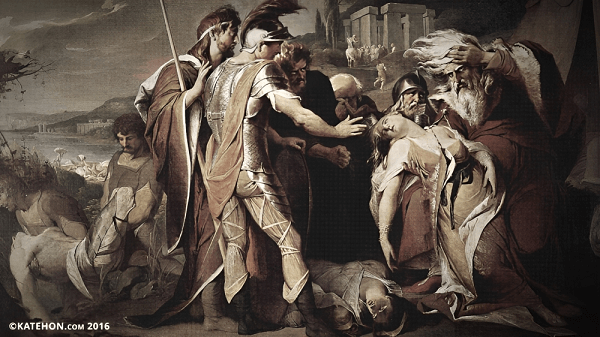
Impact of King Lear on Shakespeare's Legacy:Shakespeare's play King Lear, frequently cited as one of his best works, has considerably influenced the author's legacy. Shakespeare's timeless creativity is demonstrated by the play's treatment of themes like power, family, lunacy, and betrayal, which has struck a chord with audiences for generations. King Lear has significantly impacted the literary world and its continuing appeal. Numerous adaptations, including stage productions, films, and novels, have been inspired by the play's complex characters, intricate plot, and powerful language. The influence of Shakespeare's subjects and writing style can be observed in the works of authors like Samuel Beckett, T.S. Eliot, and Harold Pinter. The ageless themes of love, loyalty, betrayal, and the pursuit of power are still present in King Lear today, and it is admired for its insightful examination of human nature. Modern versions like the movie "A Thousand Acres" and the play "King Charles III" demonstrate its influence. King Lear is among Shakespeare's most durable and significant works and has endured as part of his legacy. Conclusion:The exploration of power, family, lunacy, and betrayal in King Lear makes it a timeless masterpiece that never fails to enthrall viewers. This play, which has significantly influenced literature and culture and sparked innumerable adaptations and interpretations, is a brilliant example of Shakespeare's talent. Shakespeare's ageless themes and enduring impact, which continue to influence and inspire authors and readers worldwide, are demonstrated by King Lear's enduring relevance.
Next TopicKubla Khan Poem Summary And Analysis
|
 For Videos Join Our Youtube Channel: Join Now
For Videos Join Our Youtube Channel: Join Now
Feedback
- Send your Feedback to [email protected]
Help Others, Please Share









